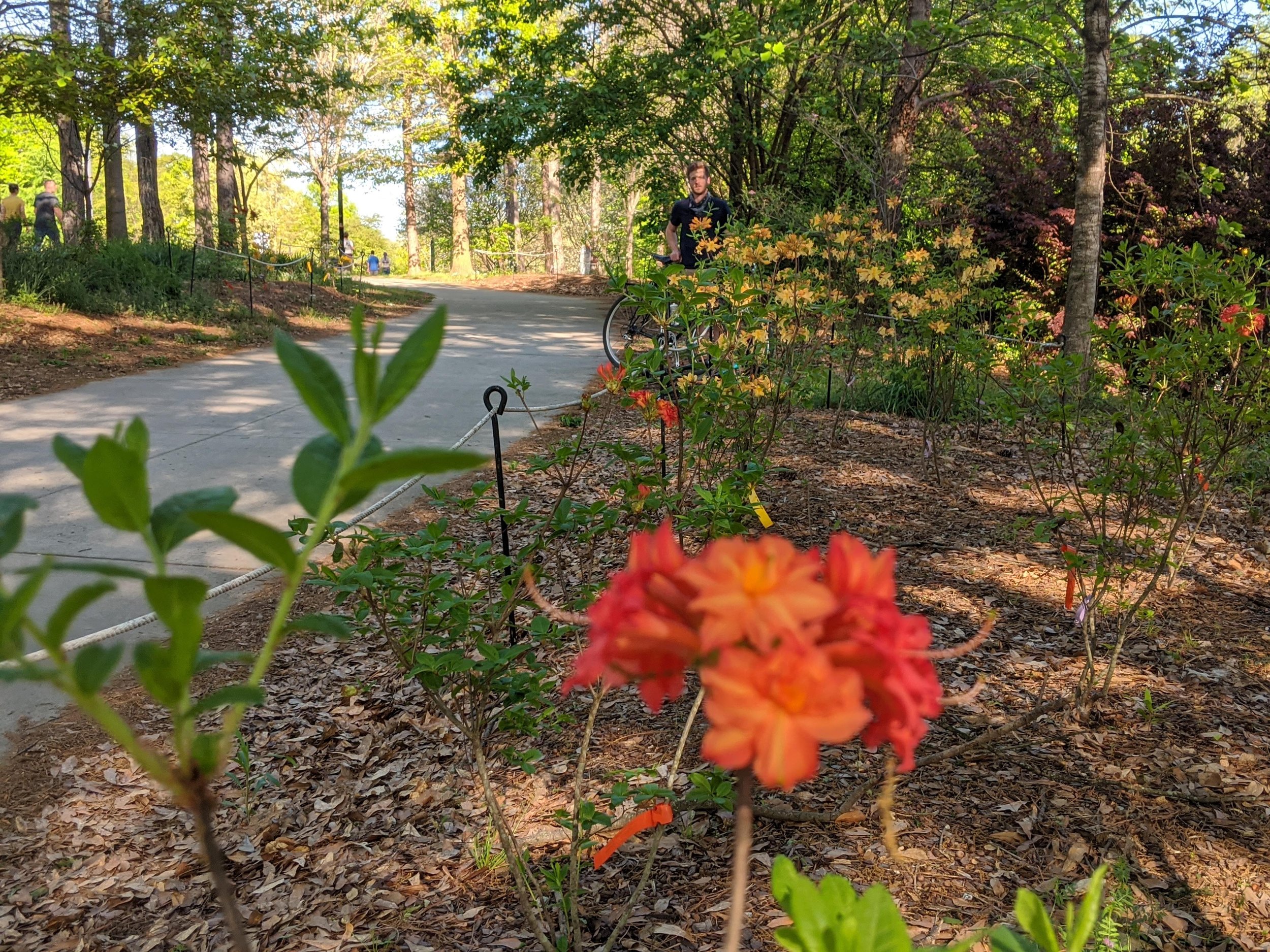Atlanta BeltLine Arboretum


































The Atlanta BeltLine is one of the largest, most wide-ranging urban redevelopment programs in the United States.
It is a sustainable redevelopment project that connects a network of public parks, multi-use trails, and light-rail transit along a main paved trail artery that reuses a historic 22-mile railroad corridor. The system circles downtown Atlanta and connects 45 neighborhoods directly to each other and creates incentives to choose pedestrian movement over vehicular to places where Atlantans live, work, and play. With nearly 2 million trail users each year, the Atlanta BeltLine provides an unprecedented opportunity to use the arboretum to educate the public about ecological restoration, utilizing native plants, and how urban ecology can reconnect fragmented communities. The arboretum serves as a component of Atlanta’s urban forest, acts as an ecological corridor, a place for education, community science, and scientific research, and a learning landscape. All the while, the trees, and plants in the arboretum enhance the trail experience with the beauty and health benefits of nature in the city.
The Atlanta BeltLine Arboretum is an accredited botanical garden primarily dedicated to trees, woody plants, and native and notable perennial plants. Trees Atlanta is proud to partner with the Atlanta Beltline, Inc. in the design, installation, and maintenance of the Atlanta BeltLine Arboretum, as well as an education and community program partner.
Before the construction of the corridor began, Trees Atlanta and the Atlanta BeltLine developed a Concept Plan for the arboretum in 2007. Once installation is complete following the 22-mile main corridor of the Atlanta BeltLine, the arboretum may earn the unique title of the world’s longest linear arboretum. In 2012, the first trees were planted on the Eastside Trail. In 2016, Trees Atlanta successfully applied for and the Arboretum was awarded Level II Accreditation from the ArbNet organization, an international program of arboreta managed by the Morton Arboretum.
Strategic Goals
Create a distinctive sense of place with native and regionally-adapted plants of the bio-regions of Georgia, with special emphasis on Piedmont.
Activate the Atlanta BeltLine Arboretum as a corridor for education and scientific research by Trees Atlanta and its partners.
Demonstrate botanically diverse collections and sustainable landscape management practices.
Restore the soil and environment of the former urban industrial railway corridor.
Enhance neighborhoods, community parks, and greenspaces, by improving access to nature, quality of life, and health for all of metro Atlanta.
Build a healthy urban ecosystem and connect wildlife corridors.
My role involved:
Managing and administering the arboretum program and all projects relating to the Arboretum
Produced landscape plans and landscape maintenance programs and schedules
Managed the installation and budget of 3 miles of ball and burlap Arboretum planting on the Atlanta BeltLine Westside Trail including attending construction meetings, managing contractors, following construction calendars, and overseeing safety compliance.
Expanded the public education component of the Atlanta BeltLine Arboretum program and established BeltLine Arboretum Workshops (taught by all staff members), Work and Learn volunteer events, developed and installed permanent interpretative signage along 3 miles of trail, community science photo stations to monitor landscape change, and a monthly BeltLine blog post series.
Designed and constructed a series of pocket public gardens to provide valuable public spaces promoting the wonder of our natural world. Pocked public gardens include The Stumpery Garden (highlighting the natural recycling of wood) The Longleaf Pine Savanna (demonstrating the unique longleaf pine ecosystem), Persimmon Woods (natural trail through a remnant forest displaying woodland ephemeral plants), and wrote and managed an RFP for a public art installation called the ConNectar (an arching installation of flying pollinators).
Wrote the management plan, strategic plan, and collections policy for the Atlanta BeltLine Arboretum. Hired and managed the BeltLine Arboretum Fellowship and oversaw the work to reaccredit the BeltLine Arboretum with ArbNet, updates to the ArcGIS Arboretum Data Inventory, and submission of our collections to the Botanic Gardens Conservation International.
Completed the woody-plant species landscape design for ~1 mile of the BeltLine Arboretum on the Southwest Connector Trail.
*All work was completed while employed at Trees Atlanta, 2016-2020
SOUTHWEST CONNECTOR TRAIL
The Southwest Connector Trail was opened in 2022 and is an approximately 1 mile paved trail connecting the neighborhoods Beecher Hills, Mozely Park, West End, Westview, and Westwood Terrace.
The landscape plans for Southwest Connector Trail included over 2,000 trees adding to the arboretum which includes more than 9,000 accessioned plants in its collection, with 369 unique tree and shrub species and cultivars. Eighty-eight genera of trees and shrubs are represented and identified with permanent signage.



















